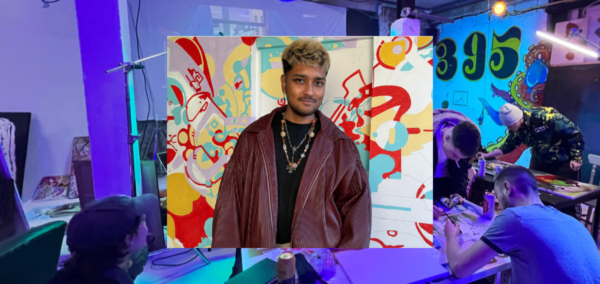
Meet the second year Edinburgh student who’s having her first book published
Claudia Efemini’s book provides a voice for Nigerian history through historical fiction
The University of Edinburgh has been home to numerous talented individuals, and second-year history and politics student Claudia Efemini is no exception. With her recently published historical fiction novel, A Letter Away From Asaba, The Edinburgh Tab had the pleasure of interviewing her about her book, inspiration, and writing process.
A Letter Away From Asaba is a thought-provoking narrative centred on the Asaba Massacre, which occurred in 1967 during the Nigerian Civil War. The story follows the lives of best friends Onome, a Nigerian international student studying law at King’s College London, and Chioma, who lives in Asaba, Nigeria, and experiences the harrowing event firsthand. As Onome notices the blatant censorship of the event within the British press, the two friends attempt to publicise the massacre’s existence through a series of diary entries and letters, facing unexpected hurdles.
Claudia Efemini writes in the style of an epistolary novel in diary entries and letters, expressing the two young women’s emotions more intimately, bringing attention to the massacre and overcoming censorship surrounding the event.
“The structure allows for a mixture of narration and letter writing, keeping the reader well informed on the lives of Onome and Chioma, and making the story feel more intimate as a whole”, she said.
The newly published author first delved into the Asaba Massacre during her International Baccalaureate when writing on the massacre for her extended essay and was struck by the lack of information and research on the Asaba Massacre. “It was hard to find resources and proper research on the massacre, and that showed how censored it was and still is, that pushed me to learn more.”
Most Read
View this post on Instagram
This clouded history became the catalyst for her novel. Drawing inspiration from Half of the Yellow Sun by Chimamanda Ngozi Adichie, Efemini chose historical fiction as her medium to convey the story, inspiring her decision to write a historical fiction on the Nigerian Civil War.
Set during the Nigerian Civil War in the 1960s, Half of a Yellow Sun is a novel revolving around five characters: Ugwu, a houseboy; Odenigbo, a university professor; Olanna, Odenigbo’s lover; Richard, an English expatriate; and Kainene, Olanna’s twin sister. Through their experiences, the novel explores the impact of the war, the struggle for the secessionist state of Biafra, and the complexities of love, loyalty, and identity in a time of crisis.
“The massacre is definitely neglected in Nigeria”, said Efemini, noting that her Nigerian parents didn’t know about it despite the event’s magnitude. “Asabians know about it, do a lot to commemorate it, built a memorial, and there’s cause to recognise the event formally – work’s being done by lawyers, but Nigeria as a whole has not much clue about it.
“The Nigerian government censored the massacre, and radicals still justify it today. Before writing the book, I’d never met anyone directly affected by the massacre, in some way giving the book more purpose.”
Living across Europe, Efemini wanted to learn more about her culture, noting the absence of Nigerian history in schools due to colonialism. This pushed her to explore her history and advocate for its teaching in schools and beyond.
“I lived in Sweden and England, and I noticed a lack of Nigerian and non-European history being taught in both; efforts to decolonise the curriculum are noticeable, but there’s still a long way to go, I was exploring an area of history that my course didn’t,” she said, finding the Historian’s Toolkit course in first year helpful in equipping her with the tools to write the novel, although not the knowledge to do so.
Growing up with male-dominated books, Efemini felt compelled to create a novel with strong female characters. While initially intended to set the entire story in Nigeria, she found it difficult, having grown up in London and Sweden her whole life.
“I had Onome live in London while keeping the story based in Nigeria, so I could use my experiences of living in London to make the story more realistic and detailed. Writing a fictional story based in a country that I have never lived in was really challenging. I drew on conversations I’ve had with friends and family who live there, my ethnic ties to Nigeria and my imagination so I could create a balanced story.”
View this post on Instagram
Efemini’s father, who used to write stories with her as a child, and her mother, who helped develop the characters, played a significant role in shaping the book. The novel has opened up more conversations about politics and history with her family, connecting her to a man whose grandmother died in the massacre, further cementing the book’s purpose in her eyes.
“Historical fiction can be a powerful tool for teaching history. It can put readers into a story and allow them to connect with the characters emotionally; we can encourage them to empathise with the experiences of people who lived through these events and even inspire them to learn more about this history.”
After submitting her novel to a publisher, Efemini received a book deal, but declined the offer and decided to self-publish due to unfavourable contract terms. Although initially worried, she has found the experience extremely rewarding so far.
The University of Edinburgh’s supportive environment and academic resources significantly encouraged Efemini to publish her book. Writing the novel furthered her interest in Nigeria, tribalism, and advocating for African history and minority histories to be taught in schools, universities and beyond. “If we’re not sitting at the table, it won’t be changed as it should.”
With her passion for Nigerian history and commitment to promoting inclusive education, Claudia Efemini is poised to make a lasting impact on how history is taught and understood in the future. She continues to advocate for teaching Nigerian and minority history and works on her next book on experiences in London of Afro-Caribbean tensions.
The newly published author intends to continue her studies at the University of Edinburgh, delving deeper into the intersection between history, politics, and literature. Efemini is optimistic that more people will appreciate Nigerian history’s rich and complex tapestry and the importance of preserving these stories for future generations.
You can buy Claudia Efemini’s new book here.
Featured image via Instagram @claudiaefemini
Related stories recommended by this writer:
• Only least privileged students accepted to study law at Edinburgh University
• Edinburgh University saves over £64,000 per day during strike action
• What we learn from listening to Edinburgh University’s state school students



















